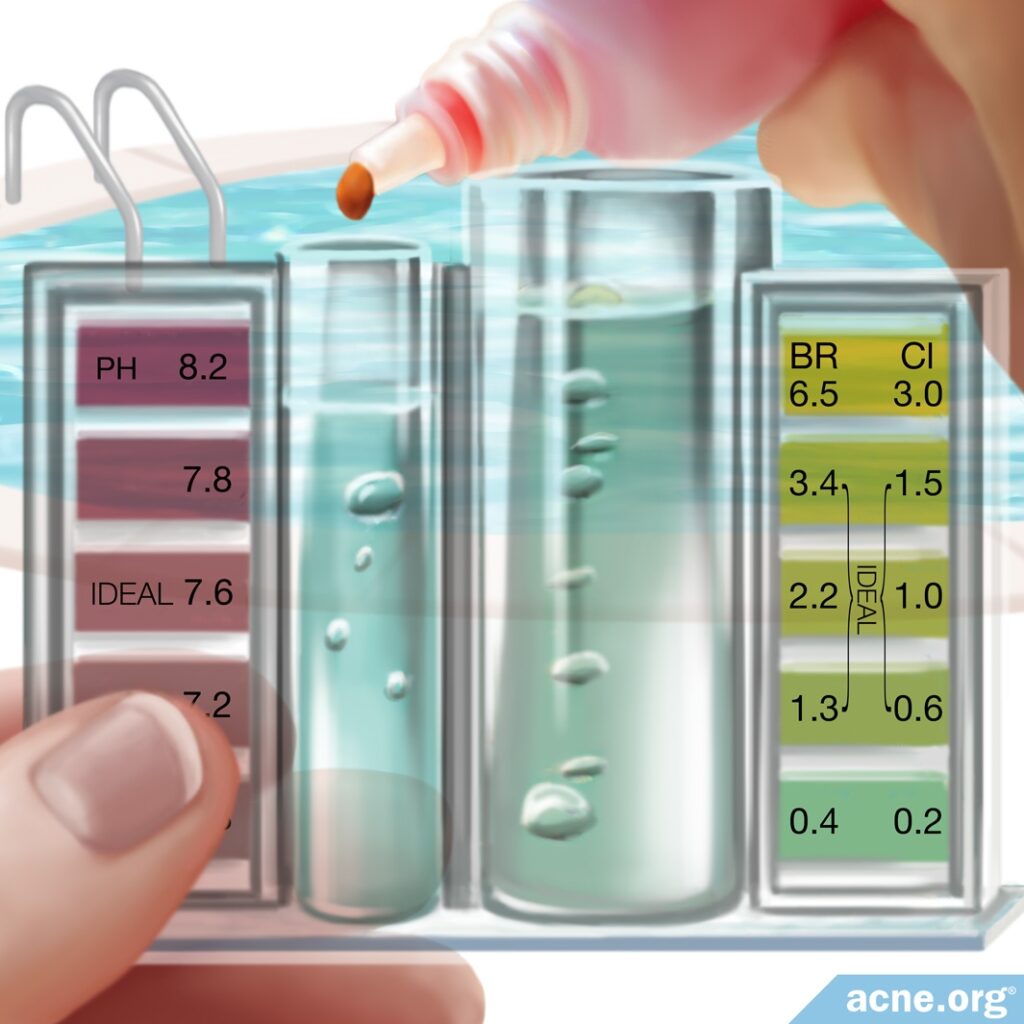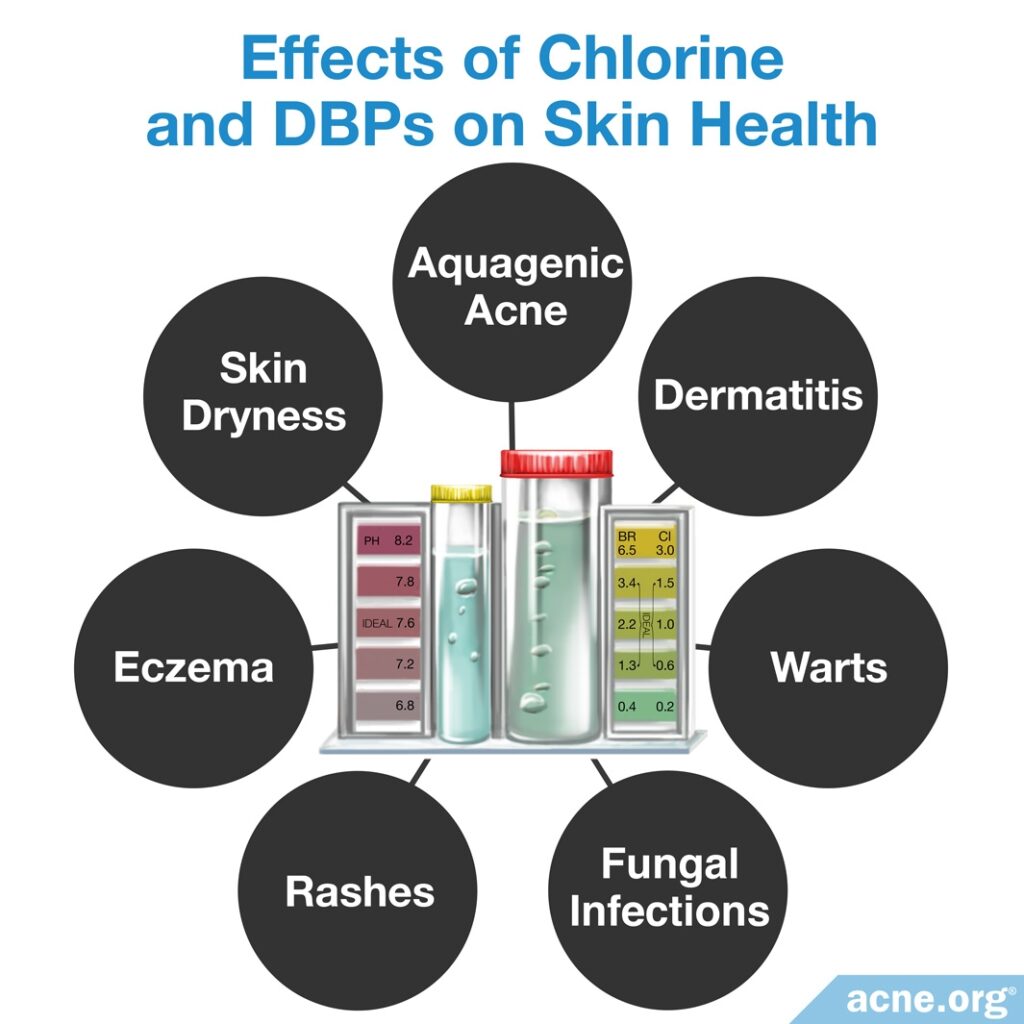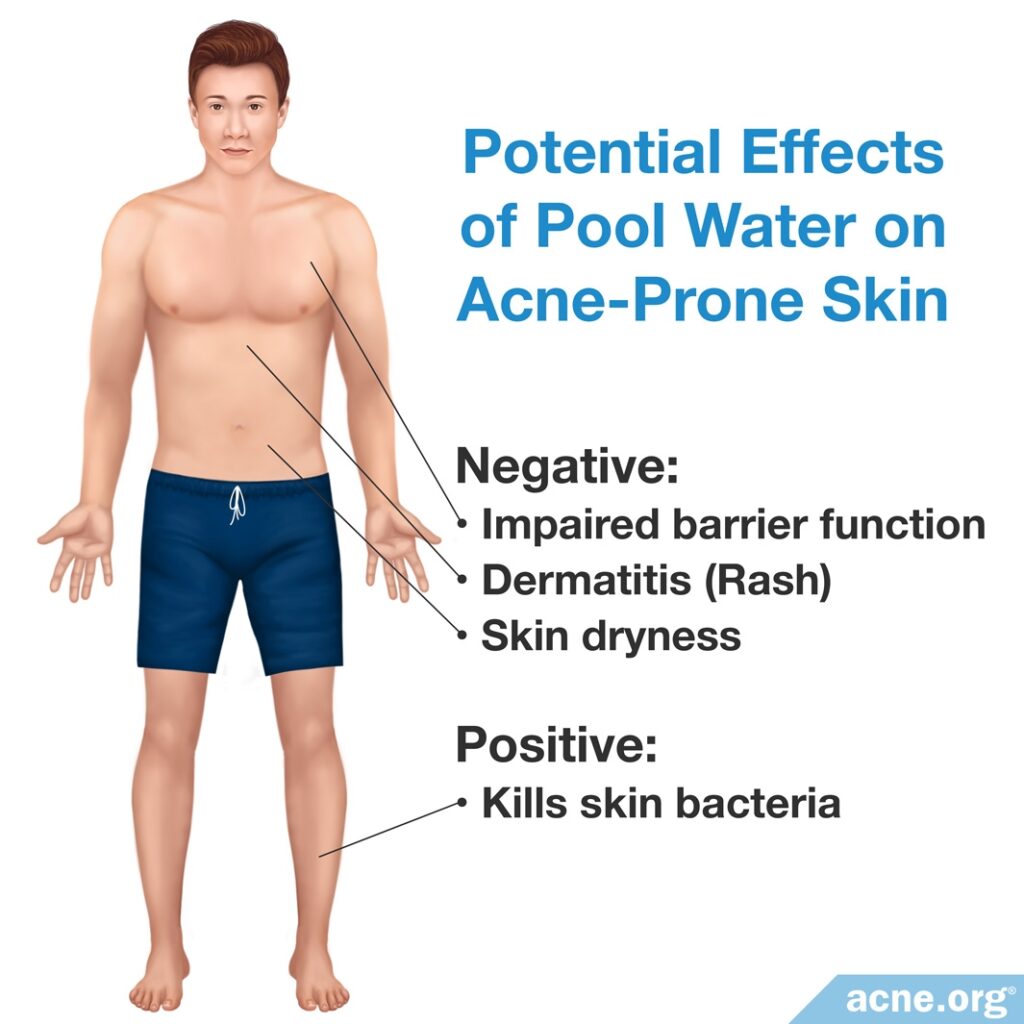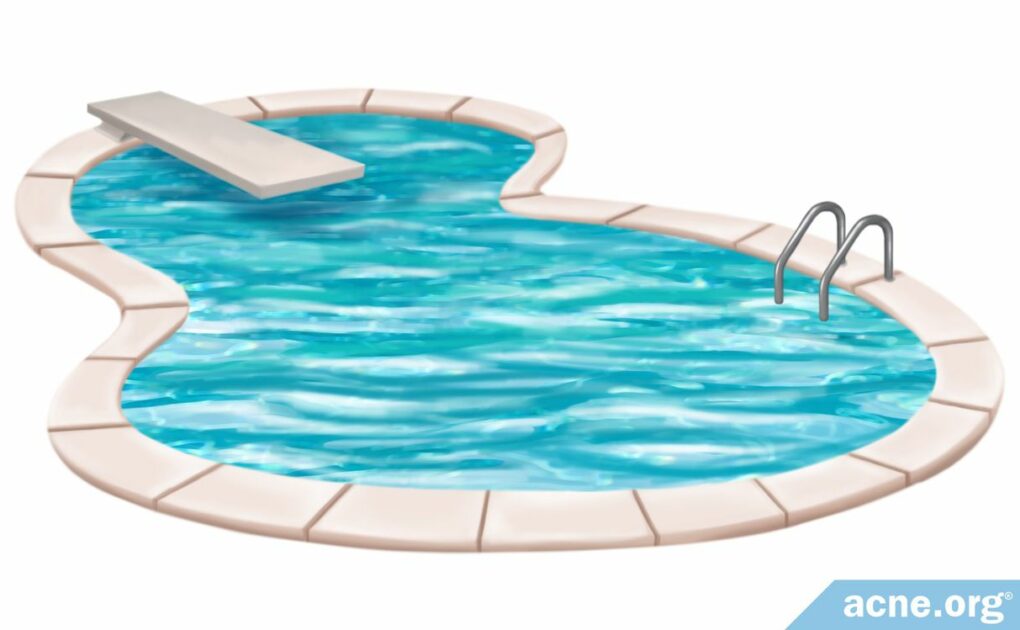It’s A Mixed Bag. It Can Irritate and Dry the Skin, but Also Might Kill Acne Bacteria.

The Essential Info
Don’t be afraid to swim in a pool if you have acne, but be aware that chlorine and other disinfectants in pool water can be irritating and drying to the skin. Overly-dry and irritated skin can perpetuate the acne cycle so it is important to keep your skin balanced and hydrated.
This means it is important to:
- Stay very gentle when drying off and very gently pat your skin dry to avoid physically irritating the skin.
- Try to time swimming activities so you can perform your morning or evening anti-acne regimen after you swim. At the very least, moisturize your skin after swimming.
Can Pool Chemicals Reduce Acne? This is an interesting question that remains unanswered. Disinfecting chemicals in pools are specifically designed to kill bacteria and microorganisms. Since acne is in part a bacterial disease, these chemicals might help kill acne bacteria, which could potentially help with acne symptoms.
Sun Protection: Protect your skin from too much sun exposure using non-pore-clogging sunscreens. Sunburns can lead to acne as the skin repairs itself in the weeks following over-exposure to the sun’s UV rays. Look for a sunscreen specifically made for the face and be sure it says that it is “non-comedogenic” or “won’t clog pores” on the label.

The Science
- Composition of Pool Water
- Dryness of Skin
- Aquagenic Acne
- Swimming Goggles
- Folliculitis in Swimmers
- How Swimming Affects Other Skin Diseases
- TIP!
- Sun Exposure
The outermost layer of skin provides an important function called the “barrier function,” which means it keeps water inside the skin. People with acne tend to have an impaired barrier function.
Here’s the rub: Extended time in pool water may erode this barrier and decrease its function.
Real-world experience amongst Acne.org members shows us that swimming does not tend to make acne worse. So don’t get too nervous to go swimming. Instead, just take these precautions to ensure that your skin’s barrier function has the support it needs:
- Make sure to moisturize after swimming if your skin feels dry.
- Stay very gentle with your towel when you’re drying off. Being too rough can damage the barrier function.
- Time your swimming session so you can perform your anti-acne regimen directly after swimming.
Now let’s get deeper into the science regarding the composition of pool water.
Composition of Pool Water

The composition of pool water often changes depending on:
- Climate/Weather
- The number and behavior of people in the pool
- The presence of contaminants such as urine, sweat, dirt, saliva, skin cells, and personal care products used by swimmers1
Pool water is purified by two methods:
- Filtration, which removes particles drifting in the water
- Chemical disinfectants, which destroy microorganisms living in the water
To meet safety standards, any chemical disinfectants must remove 99.99% of what is called an “indicator organism” within 30 seconds of treatment. Chlorine-based disinfectants are most often used to achieve this level of disinfection. These chemicals react in water to form hypochlorous acid, which is the actual agent that kills the microorganisms.1
It goes a little deeper than this even. Stick with me.
The reaction of chemical disinfectants with organic matter in the water produces a variety of smaller compounds. These compounds are known collectively as ” disinfection byproducts,” or DBPs. Some of the most common DBPs are trihalomethanes, nitrates, chlorates, and chloramines.
Here’s why this is all important–these DBPs, along with chlorine-based disinfectants, may cause damage to the barrier function of the skin, resulting in dryness and irritation.2,3 And remember, people with acne already have an impaired barrier function, so it’s important not to damage it further.
Is there an upside to these chemicals? Since these chemicals are specifically designed to kill microorganisms, the question arises about whether they also kill acne bacteria, which might potentially help with acne. This has not yet been studied but is a possibility.
Dryness of Skin
The most common skin disorder seen in swimmers is excessive dryness of skin, otherwise known as swimmer’s xerosis.4
Why should people with acne care about having dry skin? Because dry skin represents an impaired barrier function, and people with acne already tend to have impaired barrier function.5
This dryness occurs when the outermost layer of skin, called the stratum corneum, becomes stripped of natural oils or otherwise becomes damaged. Pool water can strip away skin oil during an extended period of time in the water, thus damaging the barrier function of the skin.4
One study conducted in 2003 found that chlorinated water can reduce the skin’s ability to hold on to moisture.6
Expand to read details of study
Showering can make it worse: Swimmers shower more frequently than others because they usually shower after they swim. However, over-washing the skin should be avoided for people with acne because…you guessed it…over-washing can also damage the skin’s barrier function. For this reason, the skin should get wet no more than twice per day.
Aquagenic Acne – A Special Case of Acne Affecting Swimmers
Aquagenic acne, a medical term for acne caused by contact with water, is a common skin disorder that affects swimmers. While it has its own name, it really is just common acne, and the treatment is the same. It is simply called aquagenic acne because of how water aggravates the condition. People who normally have clear skin can develop aquagenic acne, or people who already have acne can see a worsening of their acne.4,7
There are 3 processes that may contribute to the onset of aquagenic acne:
- Skin oil (sebum) overproduction: Skin oil-producing glands in the skin overreact to loss of skin oil from the top layer of skin during swimming. As the skin oil, called sebum, washes off of the surface, the skin produces more sebum at a higher rate to replace what is lost. Since more sebum usually means more acne, this is one reason why swimming is thought to sometimes cause aquagenic acne.
- Pore-clogging: The damage that pool water causes to the skin’s barrier may signal the skin to over-produce skin cells in an attempt to repair itself. This overproduction of skin cells may clog pores. Second, pore-clogging sunscreens commonly used before, during, or after swimming may contribute to clogged pores.
- Disruption of the normal balance of skin bacteria: The disinfectants found in a pool can kill off some skin bacteria. While it’s possible that the disinfectants might kill acne bacteria, the same chemicals might also kill beneficial bacteria living on the skin, leading to a disruption in the normal balance of beneficial and harmful skin bacteria. In addition, pools or hot tubs that aren’t adequately maintained can actually harbor harmful bacteria. The resulting imbalance in skin bacteria might play a role in aquagenic or swimmer’s acne.8,9
To prevent aquagenic acne:
- Pay attention to the dryness of your skin after swimming and moisturize if necessary. This will help keep your skin in balance.
- Avoid comedogenic (pore-clogging) sunscreens. Look for sunscreens that are specifically made for “sensitive skin” and sunscreens that print “non-comedogenic” or “won’t clog pores” on the label. This is not a fool-proof way of making sure your sunscreen will not clog pores, but it is a step in the right direction.
Swimming Goggles
Swimmers may also develop acne due to physical irritation of the skin by swimming goggles. Anything that repeatedly rubs against the skin can cause or worsen acne, so this is something to think about.
Don’t stress about wearing goggles while swimming, but after you get out of the water, it is best to take the goggles off completely rather than, for example, placing them on top of your head.10
Folliculitis: An Acne-like Skin Condition That Can Affect Swimmers
In addition, sometimes swimmers develop a skin condition that resembles acne but isn’t actually acne. It’s called folliculitis, which means inflammation of the hair follicles. Folliculitis can occur after wearing damp, tight-fitting swimwear for long periods of time, such as during swim competitions. That’s why this condition also has the nickname “bikini bottom.” Unlike acne, folliculitis often involves an infection by a type of bacteria called Staphylococcus aureus.
You can reduce your risk of developing folliculitis by changing out of wet swimwear as soon as possible after swimming.11
How Swimming Affects Other Skin Diseases – Does This Give Us Any Clues?

Studies on how pool water and its chemicals affect other skin diseases shows us that pool chemicals may negatively affect the skin, and, in some cases, cause dermatitis, which is an itchy, inflamed, red rash, especially in people who frequently spend time in pool water. Dermatitis is evidence of an unhealthy skin barrier. Remember, anything that disturbs the skin’s barrier can potentially be bad for acne.4,7
Four studies have found a connection between chlorinated pool water and increased incidence of skin conditions like dermatitis.7,12-14

Expand to read details of studies
TIP: Perform Your Anti-Acne Regimen After Swimming When You Can
Over-washing the skin is one of the most irritating things you can do to your skin. For people with acne, it’s important to wash no more than twice per day. Getting your skin wet in a pool, or getting it wet in any other way for that matter, is tantamount to washing the skin. So, whenever possible, try to time your swimming activities so that you can perform your anti-acne regimen after swimming.
Sun Exposure
When swimming outside, you are likely exposing your skin to sunlight. Sunlight is not all bad. It promotes the synthesis of vitamin D in our bodies, which is beneficial to skin health, and may be beneficial for acne. On the other hand, over-exposure to the sun can damage the skin and bite back with acne in the weeks following exposure. A little bit of sun is ok, but make sure to avoid sunburn.
Important: When choosing a sunscreen, make sure you choose a “broad-spectrum” and “non-comedogenic” option. Look for terms like “for sensitive skin” or “for acne-prone skin” when you can find it. And when applying sunscreen, like with any other topical skin care product, use your bare hands and stay gentle while applying to avoid physically irritating your skin.
Conclusion
Swimming in a pool is relatively safe when proper precautions are taken, such as moisturizing, staying gentle when drying, avoiding over-washing after swimming, and guarding against too much sun exposure with sunscreens that do not clog pores.
If you like to swim in the ocean, here’s a similar article about swimming in the ocean.
